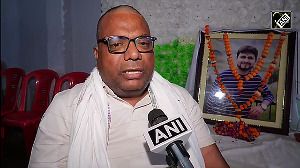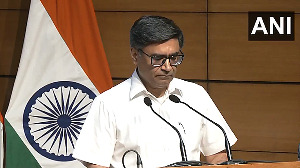'...helping the government, citizens, and companies get the balance right.'
'As great as technology is, these are societal questions, not just technical ones.'

Google has trained over 40,000 individuals through its cybersecurity roadshows and developer sessions in India as part of its commitment to upskill 100,000, says Royal Hansen, vice-president of engineering for privacy, safety, and security at Google, in conversation with Shivani Shinde and Sourabh Lele/Business Standard on the sidelines of the technology giant's flagship event Google for India 2022.
How many cyberattacks does Google's threat detection team deal with on a daily basis?
The reality is, our detection and response team deals with billions of events. It may even border on trillions.
When you think about the global activity, attacks, and anomalies, the numbers are simply staggering. We don't get to choose the layer at which we interact with it.
Google's products like Duo use end-to-end encryption. There is rising demand from law enforcement agencies the world over to intercept such encryptions. Can such exemptions be provided?
It is incredibly important that the private sector and the government, the citizens, and their companies be in constant talks on the right way to write laws and the right way to implement technology.
It is not a one-size-fits-all. It is incredibly important that the Big Tech players are at that table, helping the government, citizens, and companies get the balance right.
As great as technology is, these are societal questions, not just technical ones.
Does data anonymisation help to secure data on a large scale?
It is tricky because you have got to do it well, much like encryption.
If somebody is trying to do their own encryption, they are making a mistake.
If somebody is trying to do their own anonymisation, they are going to make a mistake.
You can reverse engineer these things.
I would just say yes, but using well-established mathematically sound algorithms.
We are lucky to have this sort of scale and expertise, to invest in those (techniques), but then we publish them so that everyone can benefit from them. But the main point is don't invent your own.
The Indian government recently released the data protection Bill. What are your views on it?
I think we talked a bit about the societal question. It is very similar to the questions that are being worked out in Europe, the US, and other parts of the world.
They are always going to be good, tricky, hard, and interesting questions for sure.
Our job is to be at the table, voicing things about the technical implementation, and what is possible, while still keeping people safe and free.
But I am not the government affairs representative in the details of legislation. But looking at it at a high level, it reminded me of the conversations I had in Brussels and Washington DC.
How much has Google invested in artificial intelligence and machine learning for cybersecurity?
We don't break it down. Because it's so common in a way like every team uses it in some way or the other.
But you've seen that number -- the $10 billion we are investing in cybersecurity over the next several years. It's a big part of that.
Feature Presentation: Ashish Narsale/Rediff.com











